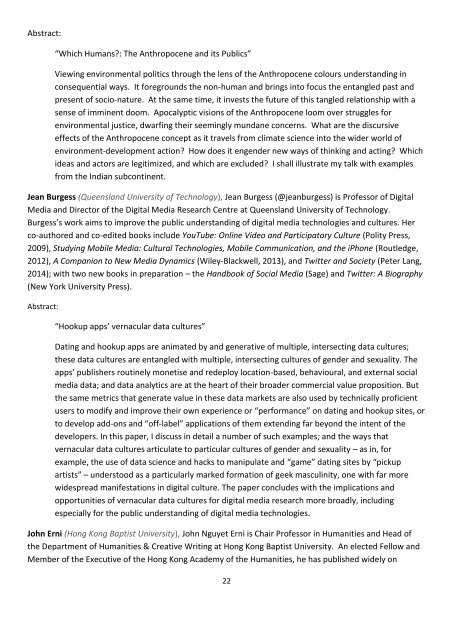Crossroads in Cultural Studies Conference 14-17th December 2016 Program Index
Crossroads-2016-final-draft-program-30-Nov
Crossroads-2016-final-draft-program-30-Nov
Create successful ePaper yourself
Turn your PDF publications into a flip-book with our unique Google optimized e-Paper software.
Abstract:<br />
“Which Humans?: The Anthropocene and its Publics”<br />
View<strong>in</strong>g environmental politics through the lens of the Anthropocene colours understand<strong>in</strong>g <strong>in</strong><br />
consequential ways. It foregrounds the non-human and br<strong>in</strong>gs <strong>in</strong>to focus the entangled past and<br />
present of socio-nature. At the same time, it <strong>in</strong>vests the future of this tangled relationship with a<br />
sense of imm<strong>in</strong>ent doom. Apocalyptic visions of the Anthropocene loom over struggles for<br />
environmental justice, dwarf<strong>in</strong>g their seem<strong>in</strong>gly mundane concerns. What are the discursive<br />
effects of the Anthropocene concept as it travels from climate science <strong>in</strong>to the wider world of<br />
environment-development action? How does it engender new ways of th<strong>in</strong>k<strong>in</strong>g and act<strong>in</strong>g? Which<br />
ideas and actors are legitimized, and which are excluded? I shall illustrate my talk with examples<br />
from the Indian subcont<strong>in</strong>ent.<br />
Jean Burgess (Queensland University of Technology), Jean Burgess (@jeanburgess) is Professor of Digital<br />
Media and Director of the Digital Media Research Centre at Queensland University of Technology.<br />
Burgess’s work aims to improve the public understand<strong>in</strong>g of digital media technologies and cultures. Her<br />
co-authored and co-edited books <strong>in</strong>clude YouTube: Onl<strong>in</strong>e Video and Participatory Culture (Polity Press,<br />
2009), Study<strong>in</strong>g Mobile Media: <strong>Cultural</strong> Technologies, Mobile Communication, and the iPhone (Routledge,<br />
2012), A Companion to New Media Dynamics (Wiley-Blackwell, 2013), and Twitter and Society (Peter Lang,<br />
20<strong>14</strong>); with two new books <strong>in</strong> preparation – the Handbook of Social Media (Sage) and Twitter: A Biography<br />
(New York University Press).<br />
Abstract:<br />
“Hookup apps’ vernacular data cultures”<br />
Dat<strong>in</strong>g and hookup apps are animated by and generative of multiple, <strong>in</strong>tersect<strong>in</strong>g data cultures;<br />
these data cultures are entangled with multiple, <strong>in</strong>tersect<strong>in</strong>g cultures of gender and sexuality. The<br />
apps’ publishers rout<strong>in</strong>ely monetise and redeploy location-based, behavioural, and external social<br />
media data; and data analytics are at the heart of their broader commercial value proposition. But<br />
the same metrics that generate value <strong>in</strong> these data markets are also used by technically proficient<br />
users to modify and improve their own experience or “performance” on dat<strong>in</strong>g and hookup sites, or<br />
to develop add-ons and “off-label” applications of them extend<strong>in</strong>g far beyond the <strong>in</strong>tent of the<br />
developers. In this paper, I discuss <strong>in</strong> detail a number of such examples; and the ways that<br />
vernacular data cultures articulate to particular cultures of gender and sexuality – as <strong>in</strong>, for<br />
example, the use of data science and hacks to manipulate and “game” dat<strong>in</strong>g sites by “pickup<br />
artists” – understood as a particularly marked formation of geek mascul<strong>in</strong>ity, one with far more<br />
widespread manifestations <strong>in</strong> digital culture. The paper concludes with the implications and<br />
opportunities of vernacular data cultures for digital media research more broadly, <strong>in</strong>clud<strong>in</strong>g<br />
especially for the public understand<strong>in</strong>g of digital media technologies.<br />
John Erni (Hong Kong Baptist University), John Nguyet Erni is Chair Professor <strong>in</strong> Humanities and Head of<br />
the Department of Humanities & Creative Writ<strong>in</strong>g at Hong Kong Baptist University. An elected Fellow and<br />
Member of the Executive of the Hong Kong Academy of the Humanities, he has published widely on<br />
22


